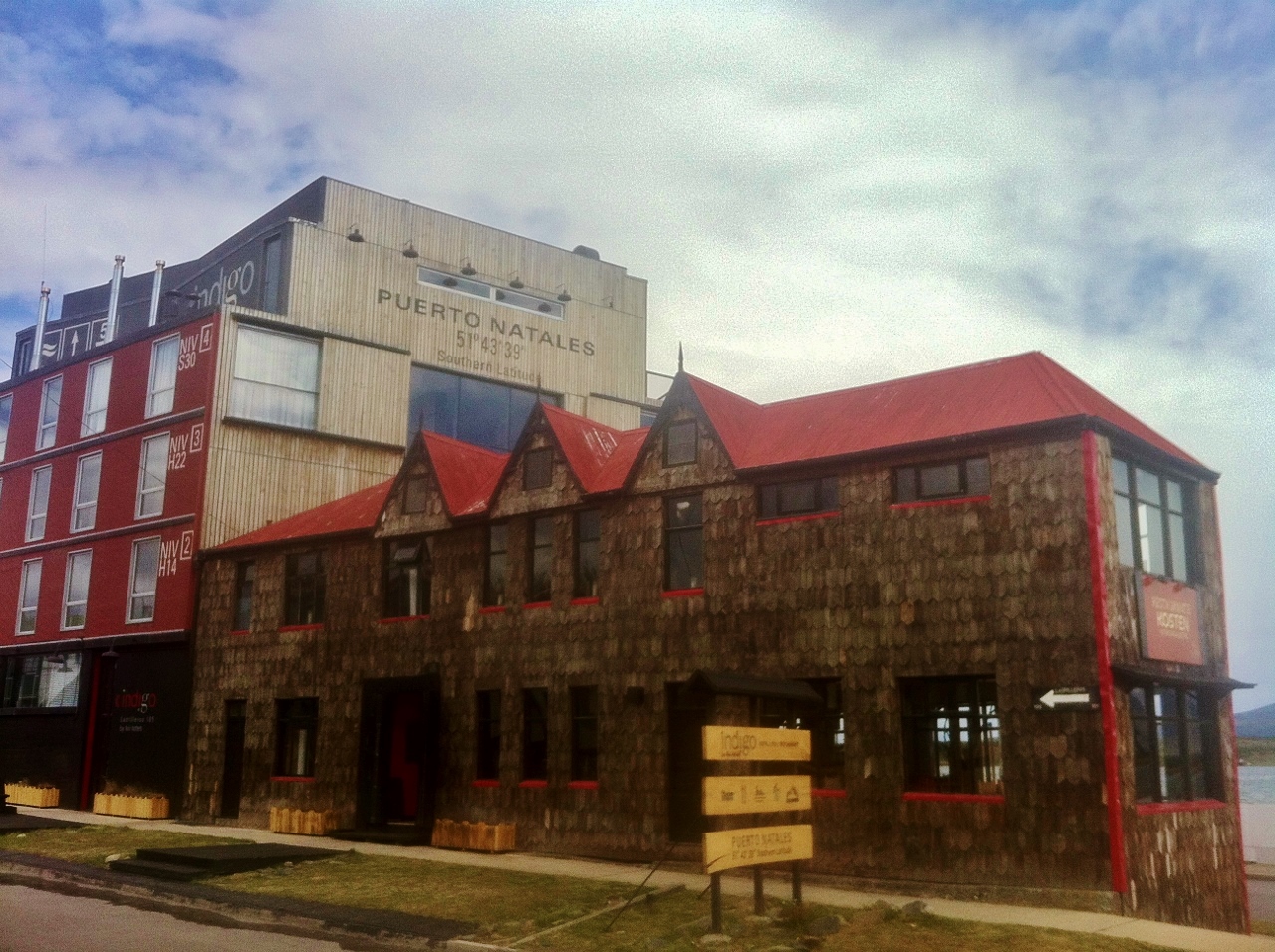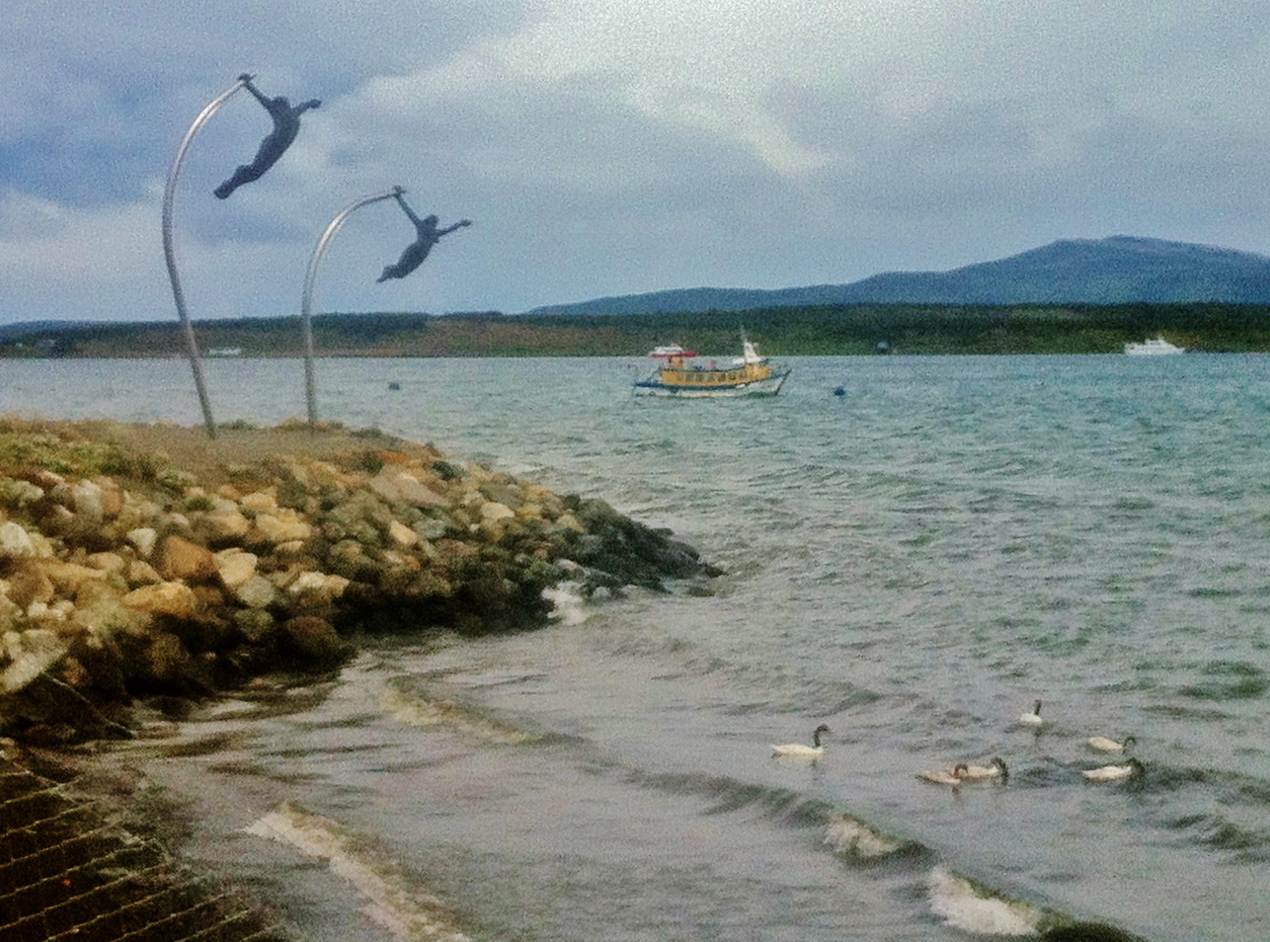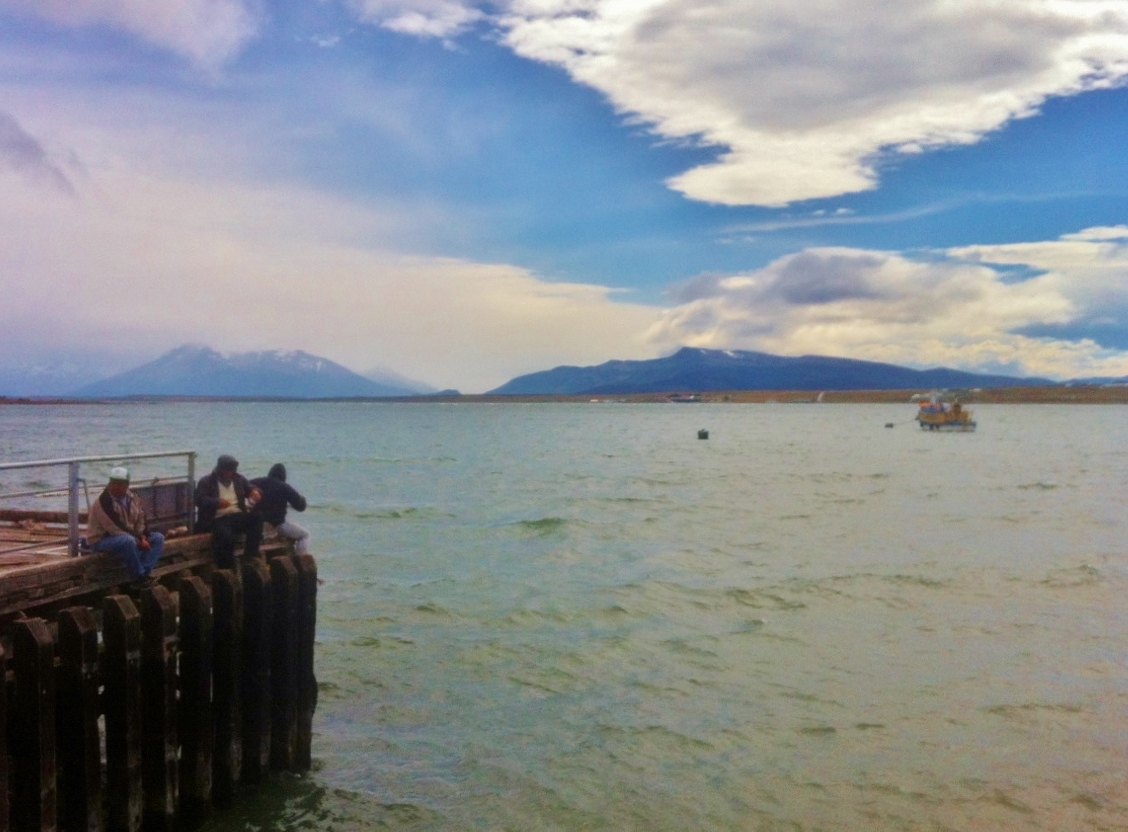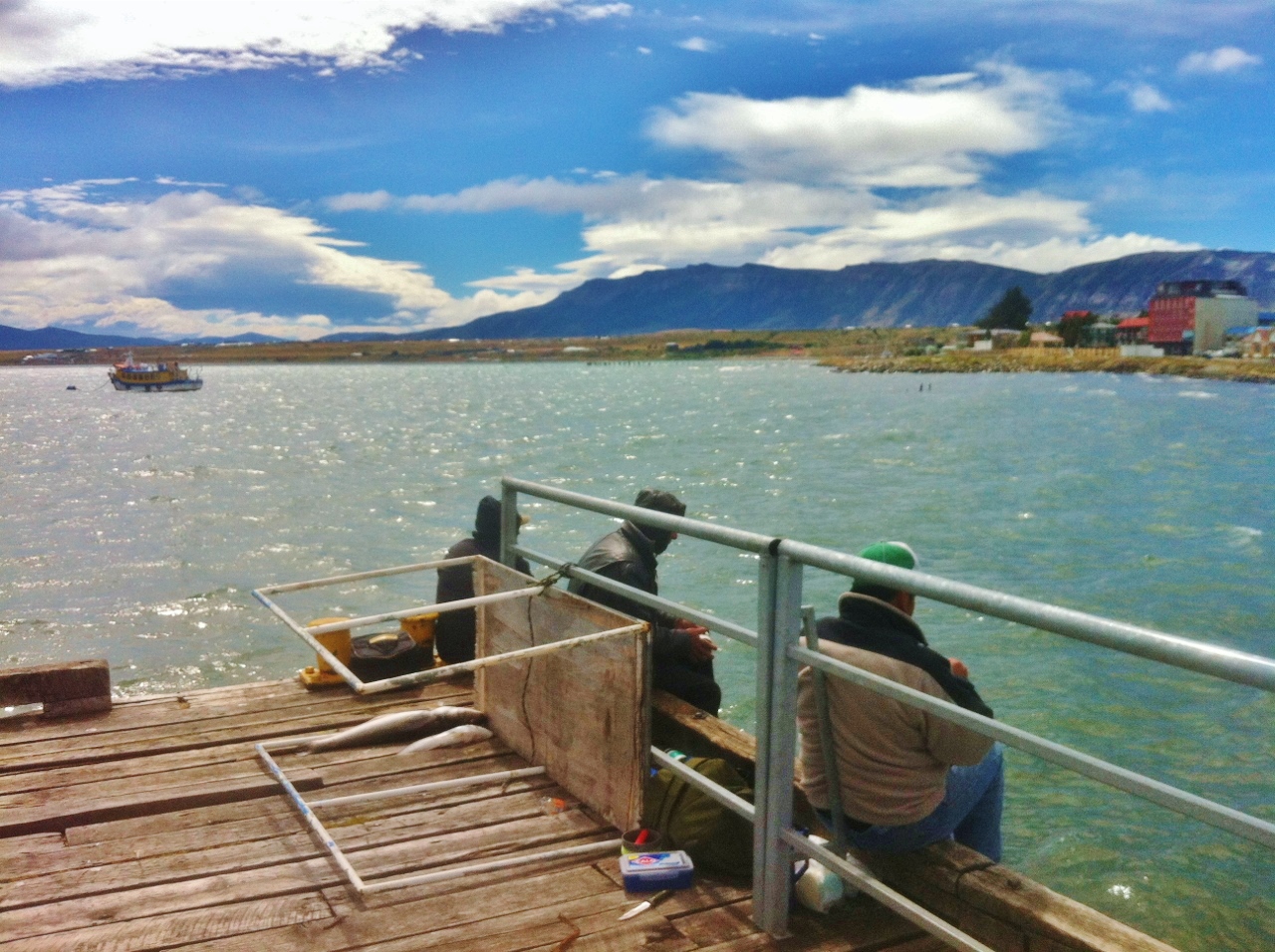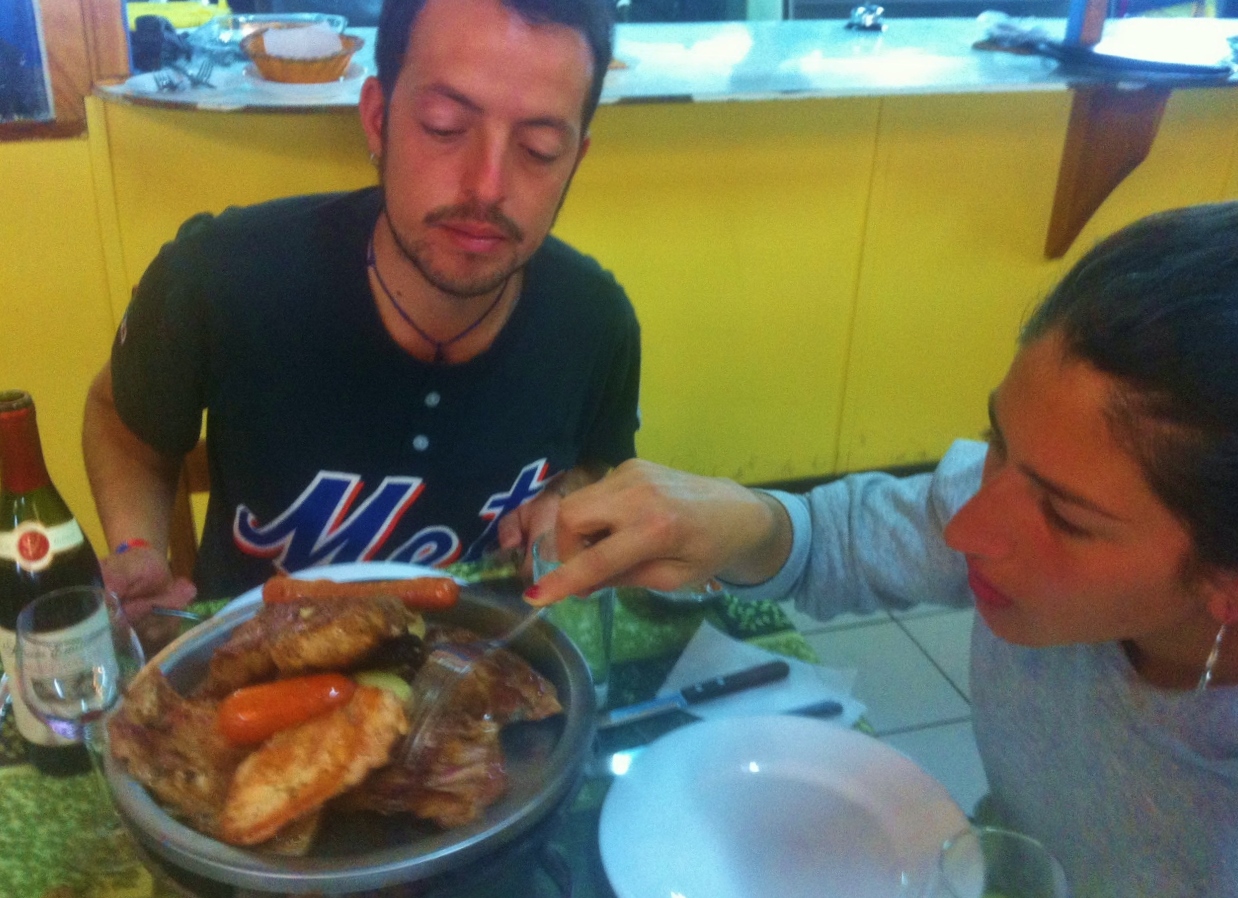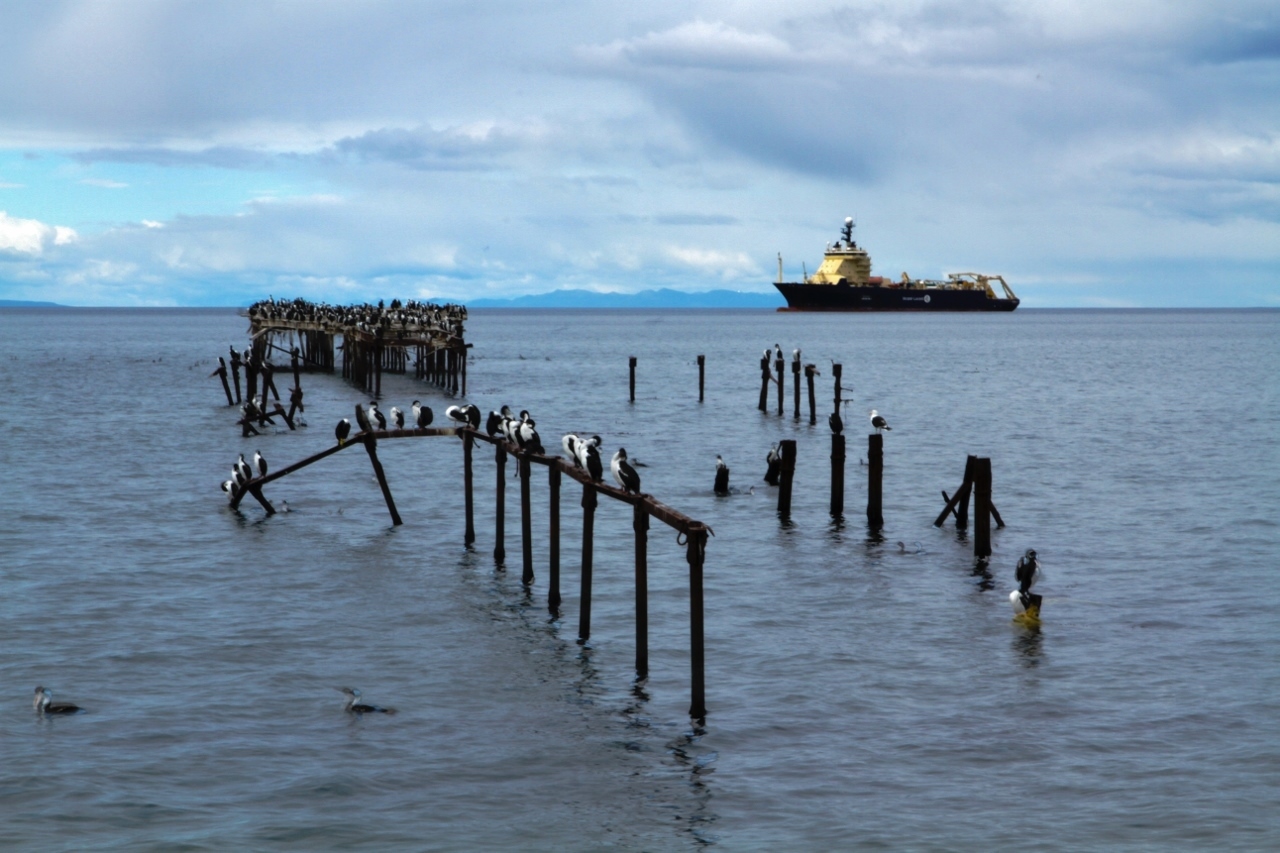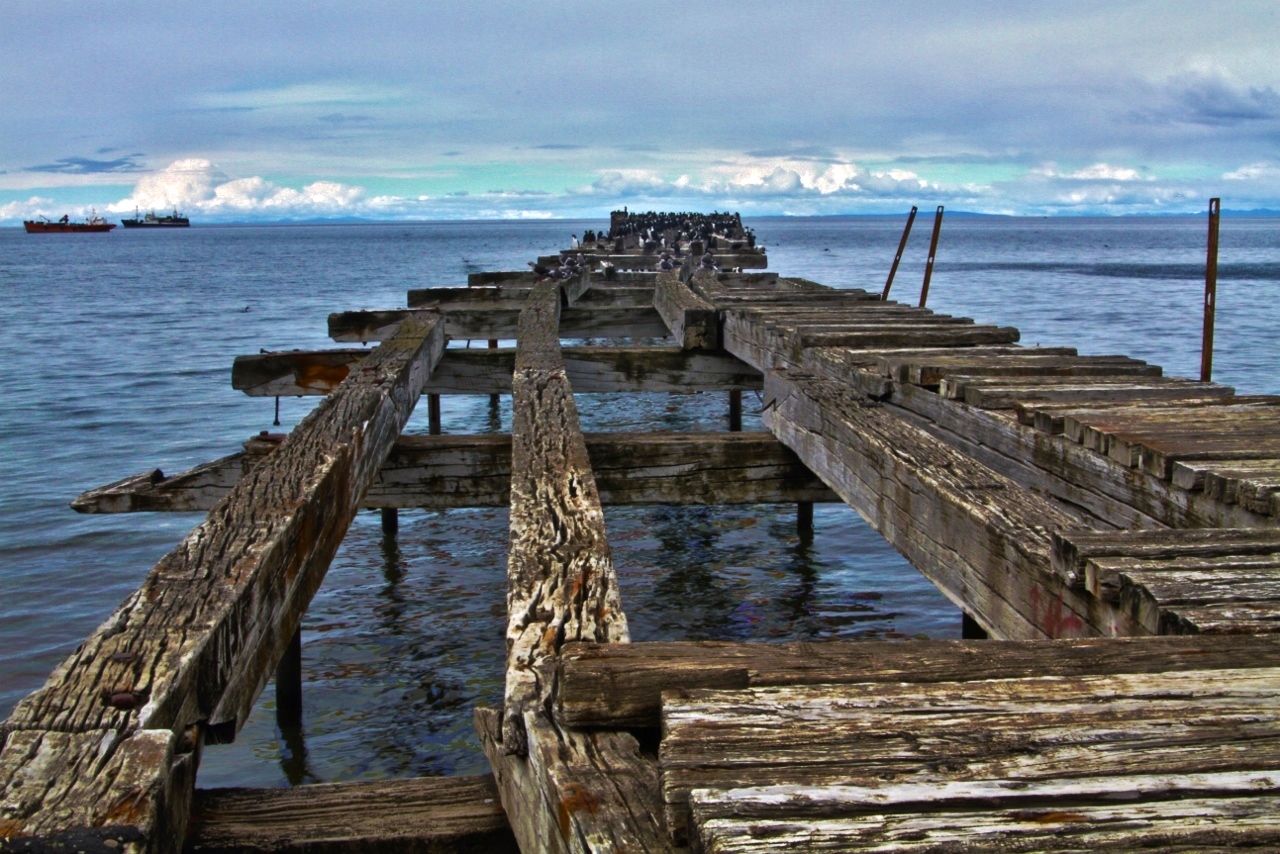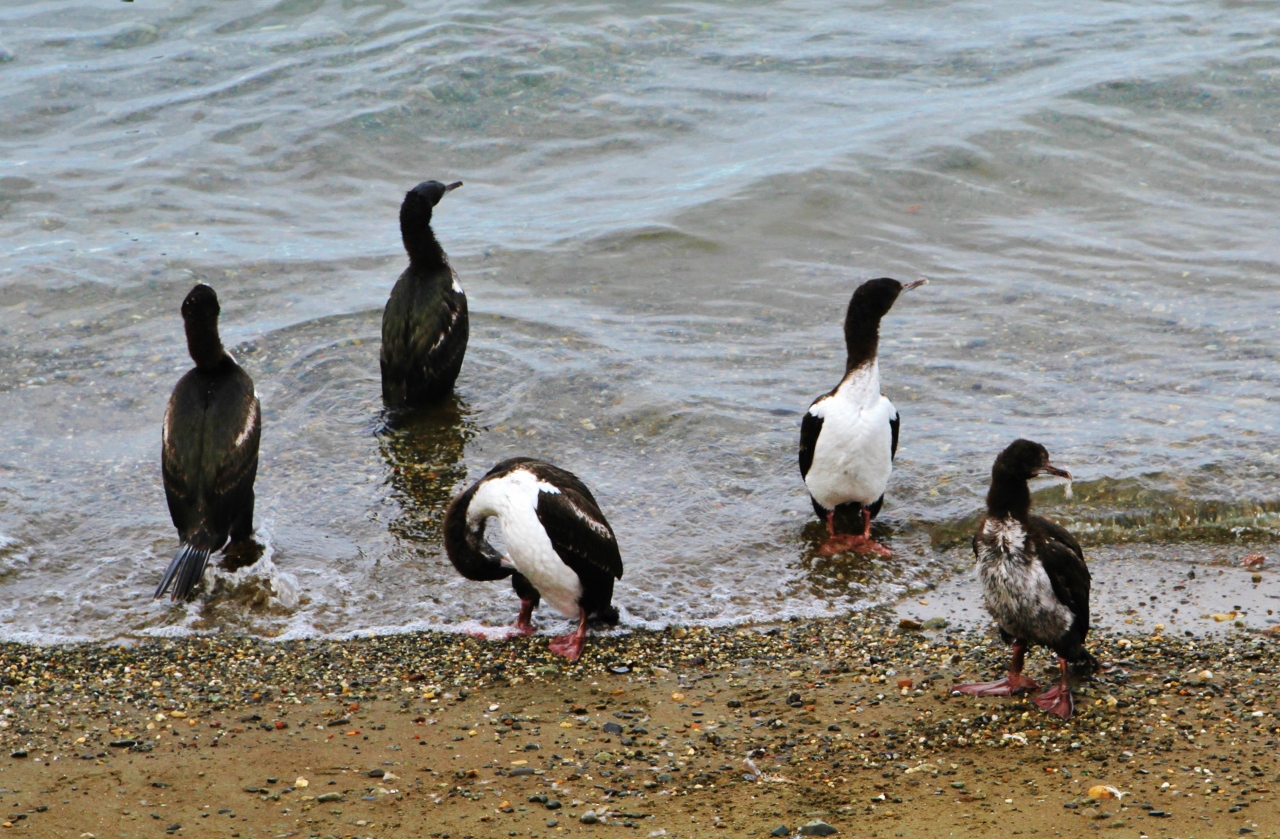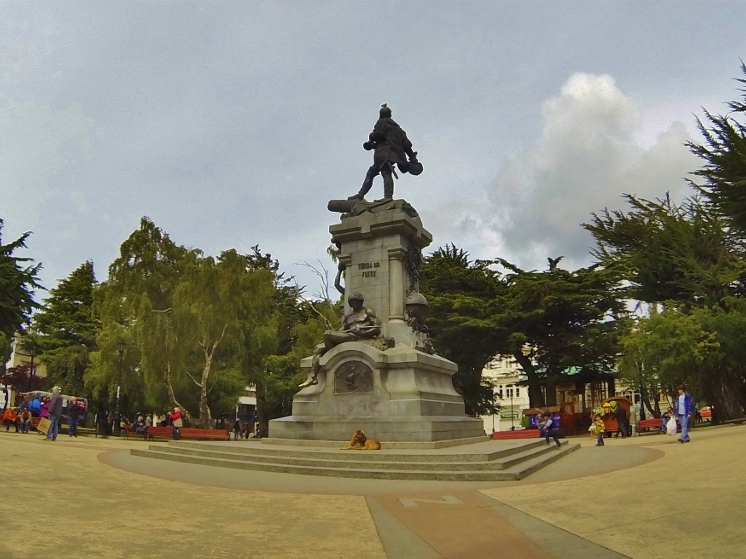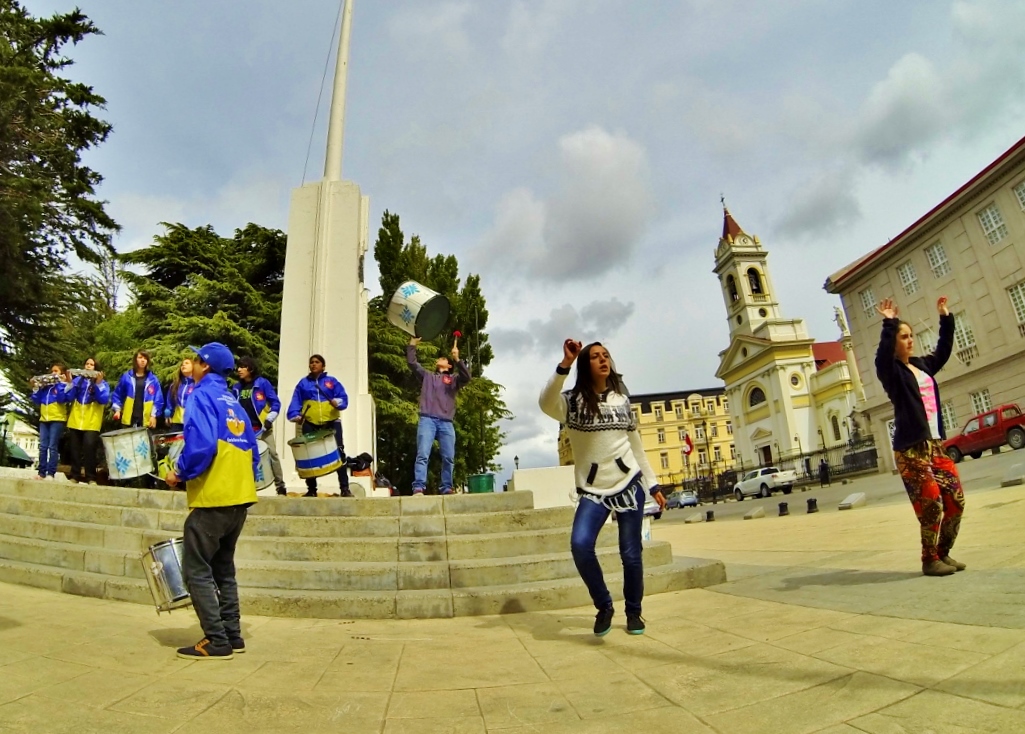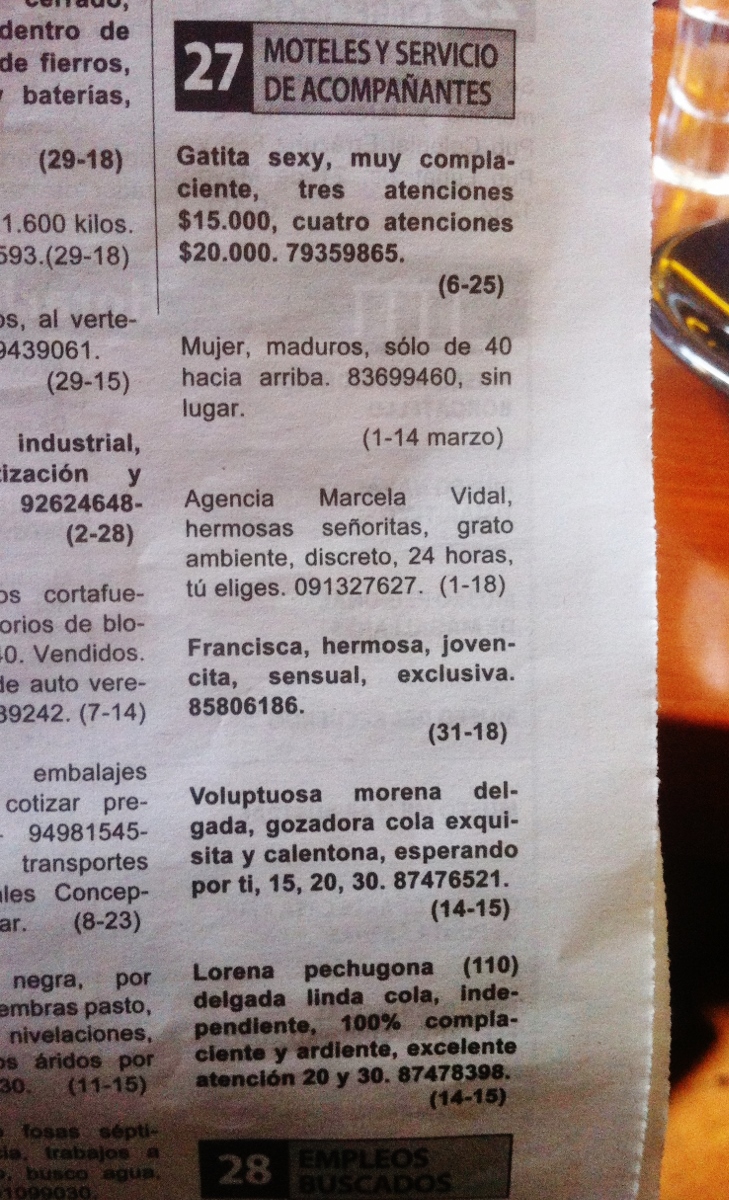I. Pizza a la Flaca
Few naps are as satisfying as the post-hiking trip nap. On the bus from Torres del Paine to Puerto Natales I dreamt of a hot meal, cold beer, and sleeping indoors. Upon arrival in it came time for the family to split up. The kids from Punta Arenas and Concepción were staying at the house of someone's aunt, but they did not have enough room for all of us. I sleepily followed Christóbal and Pollo from the bus station to a nearby hostel that they had recently stayed at, confident in their plan despite the late hour of our arrival. I've met very few people as congenial with everyone that they met as these two. Like me, they are currently vagabonds of sorts, having left their stationary lives in Rapa Nui (i.e. Easter Island) to travel around South America, so it didn't surprise me that we three got along so well.
No matter how much money you have or fancy tools you carry on a trip like this, making friends, aside from the obvious benefits, is still the most useful thing you can do for yourself. The support of my friends and family back home gave me critical support to get the trip off the ground, and their continued support, advice, and well-wishes are what sustains the inertia of this little venture. Now that I am on the road, every new friend I make on the trip adds that inertia. The utility of good friends came in to play that tired night in Puerto Natales. By their sheer natural charisma Christóbal and Pollo secured me a free night's stay in the full hostel, which meant it was time for a hot meal and cold beer. We grabbed a six pack of Cerveza Austral (brewed in Punta Arenas, don't ya know!) headed to the house of their friend, a park tour guide they had met while travelling in Perú. To describe their friend, known here only as "la Flaca", I will only say that she is lovely in both meanings of the word, but per her own request I won't be using her name nor any of the pictures--well, except one--that I took at her place.
At any rate, Christóbal happens to be a graduate of culinary school (did I mention it's a good idea to make friends?), so he made a pizza dough while the rest of us cut up a mountain of toppings. Nobody in the world was happier with their dinner that night than we three, and afterwards we talked long into the night about camping, hiking, travelling, Rapa Nui, then crime, drugs, history, politics, and all of the usual things that you talk about with a hippie tour guide and a vagabonding couple in their twenties. With a stomach full of beer and homemade pizza and a brain full of good conversation, I happily retreated back to the comfort of the hostel for the night.
Christóbal's "parcho" (patch), as he humbly calls it, is whipping up one amazing meal
In the morning I had breakfast with one of the other hostel patrons, a Chilean park ranger on vacation with his family, and the hostel owner, a former high-altitude mountain rescuer. His certifications from training in countries all over South America and Europe were found all over the hostel. Some were formally displayed on walls and mantels, but he had so many certificates and plaques that some were just laying in stacks on shelves or under side tables. I could have listened to him rattle off his mountain rescue tales for days.
After wandering around the namesake port of Puerto Natales, Christóbal decided it was high time that I tried the cordero (grilled sheep) that Chilean Patagonia is so famous for, and I can attest that this gringo was not disappointed.
Following lunch, we caught a soccer (*ahem* fútbol) match of Christóbal's favorite team, the Universidad de Chile but better known as "La U", before hopping on the bus back to Punta Arenas. Oscar had invited me to stay at his place while I resume my hunt for a new motorcycle, so I picked up my gear from the sweet folks at Hostal Doña Anita and met him at his place.
When I got there, we were only five matching neon tanktops and a ping-pong table short of a frat house. It turned out that Rodrigo and both of the Sergios were also staying at Oscar's place for awhile, as Rodrigo and "big" Sergio had hitchhiked from Concepción and didn't have money for a bus ride back, and "little" Sergio (who isn't really little, it just turns out the other Sergio is built like a linebacker) is a long-time family friend who was visiting for the summer.
Dinner with la familia at Oscar's house
II. Sandy Point
Punta Arenas, translated to "Sandy Point" in English, sits on the Straight of Magellan at the southern tip of South America, further south than any point in Africa or Australia by thousands of miles. The straight is named for the Portuguese explorer, Ferdinand Magellan, who became the first European to navigate around the southern end of the Americas on what was the first successful expedition around the world (although Magellan himself was actually killed in battle in the Philippines before the journey was over). Across said straight is the island of Tierra del Fuego, whose native inhabitants were originally referred to as "Patagons" ("big feet") by Magellan's crew and is the source of the modern-day name of this region: Patagonia.
My favorite thing Oscar pointed out to me was that, due to Chile's peculiar geography, Punta Arenas is in fact the only city in Chile where the sun rises over the sea and sets over the mountains; the rest of the country has the Andes on the east and the Pacific on the west.
In the city's main plaza, Plaza Muñoz Gamero, you can find a monument with a sculpture of Magellan on top and an unnamed Ona indian on one side. While staying in Hostal Doña Anita (before I went to Torres del Paine), I made friends with a couple of girls from Santiago, Magi and Gigi (I hope that's how she spells it) who showed me around the plaza. They told me that Patagonian legend says that anyone who kisses the "pata del indio" is certain to return to Patagonia someday.
One day in the plaza I asked a man if I could record him playing a song, which you can listen to below:
The next few weeks turned out to be an unexpectedly long stretch of rest and relaxation and, truth be told, a whole lot of bro-ing out with my new Chilean hermanos. I kept myself busy looking for motorcycles around town, at Punta Arenas' zona franca (tax-free shopping area), online, and in the local classifieds, but between searches we passed the time playing guitar and singing out on the patio at Oscar's. In no time the Sergios, Rodrigo, and I were referring to Oscar's mom as Tía Margarita rather than Señora Orrellana and his old man as Tío Nickey. When she found out how much I like to cook--and eat--she was always certain to think of something new for me to try whenever she could.
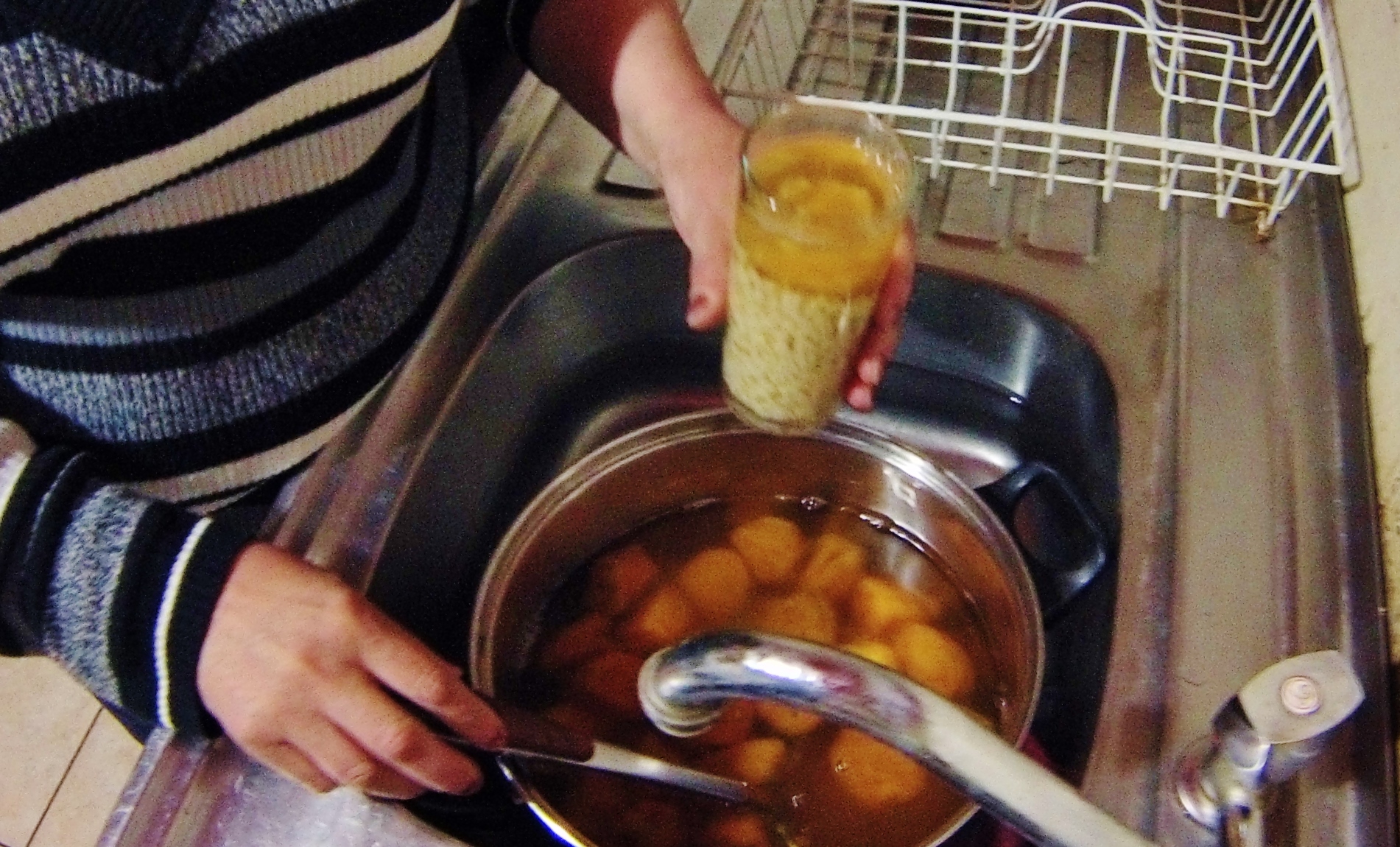
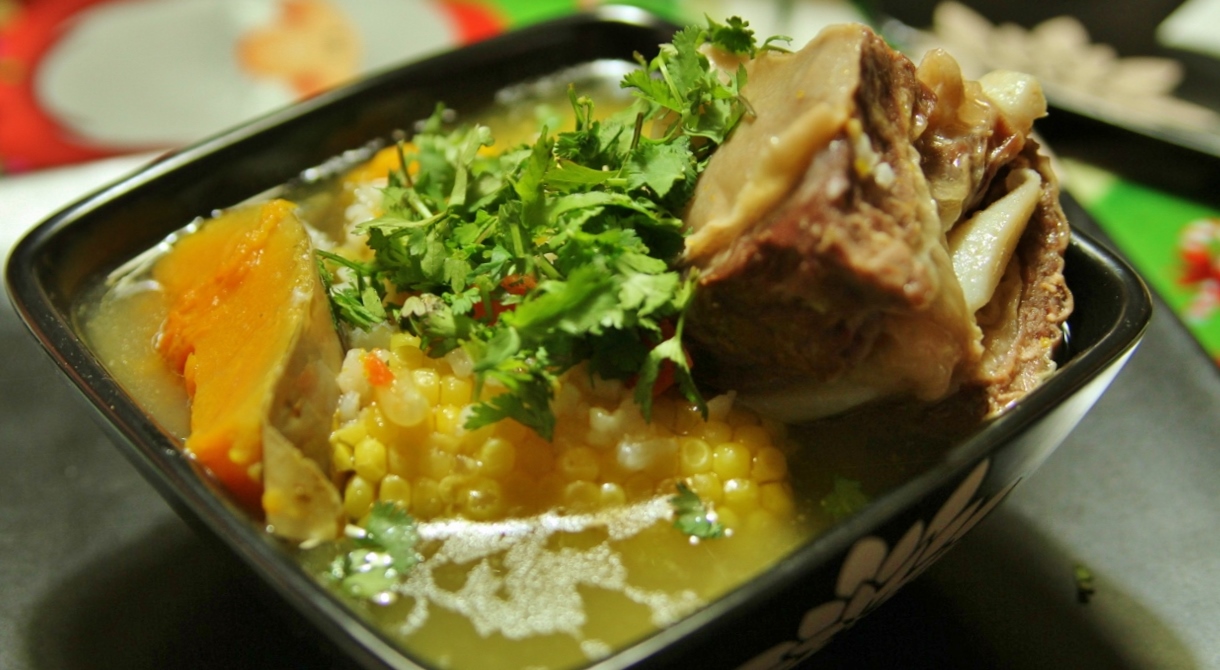
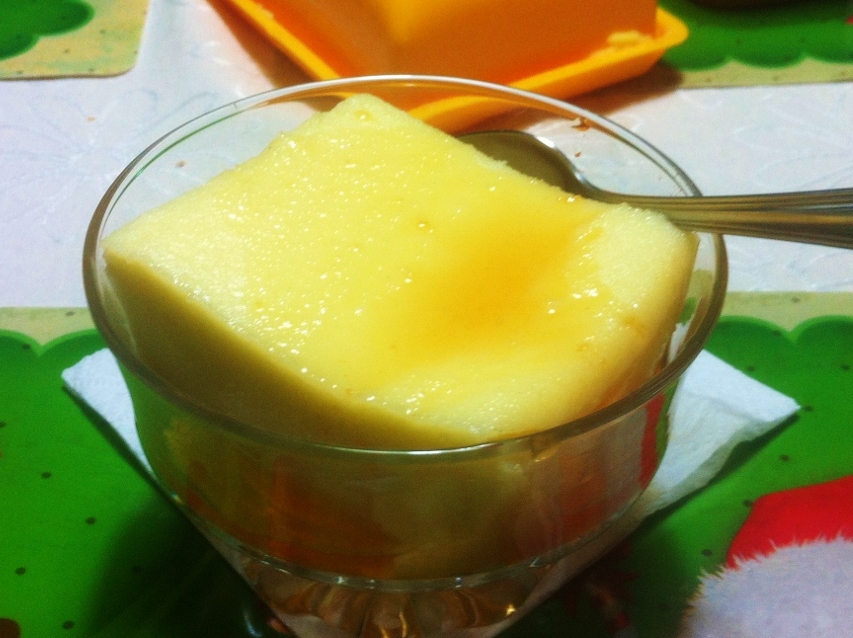
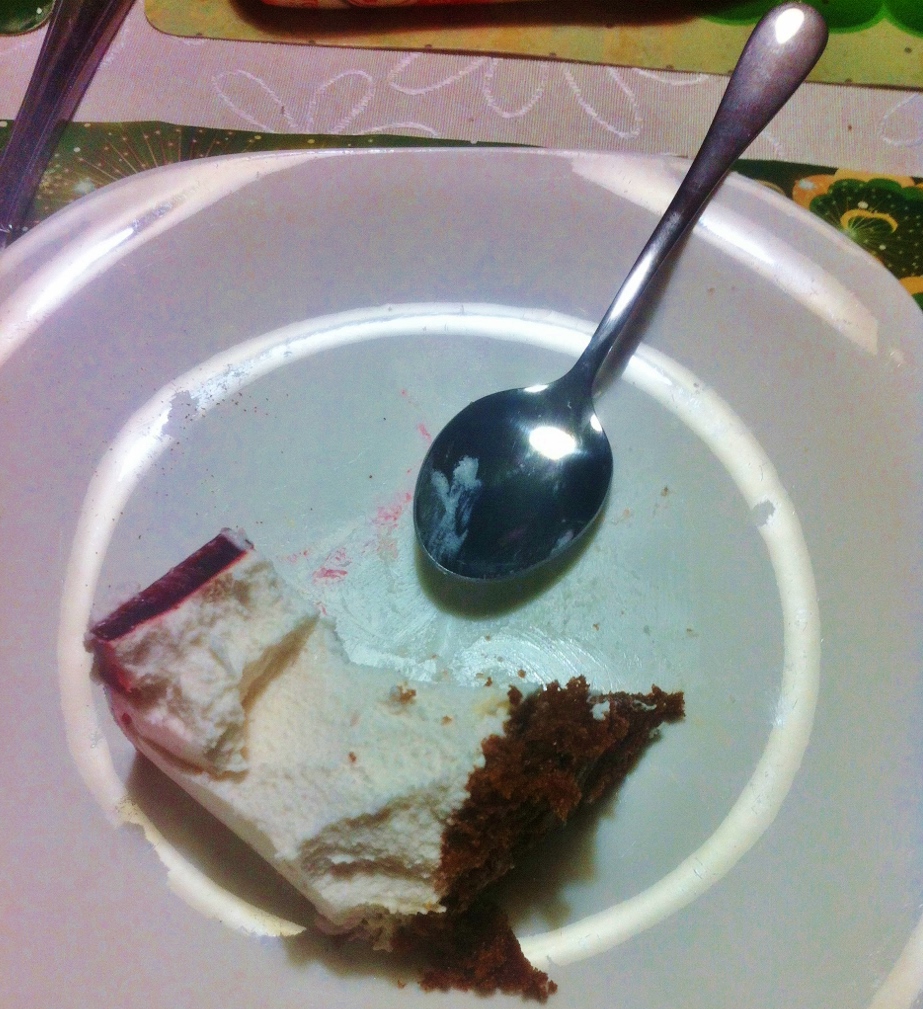
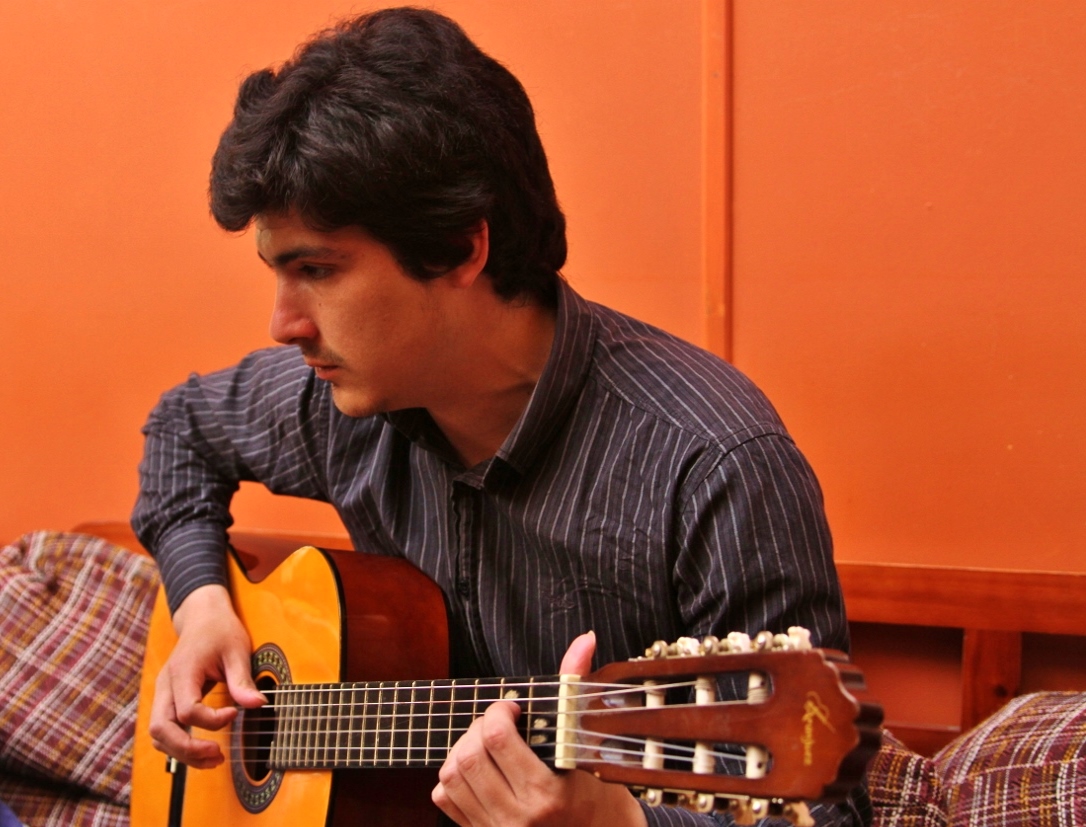
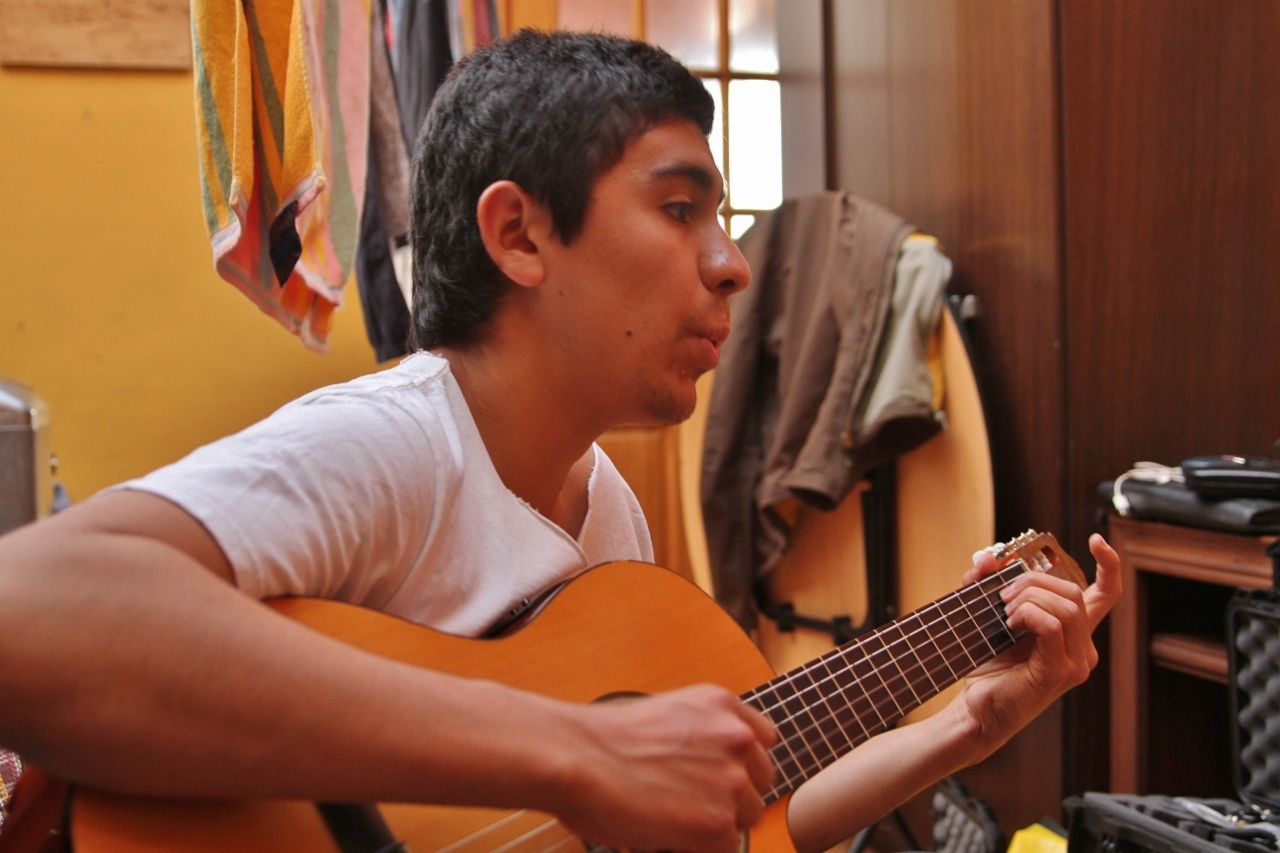
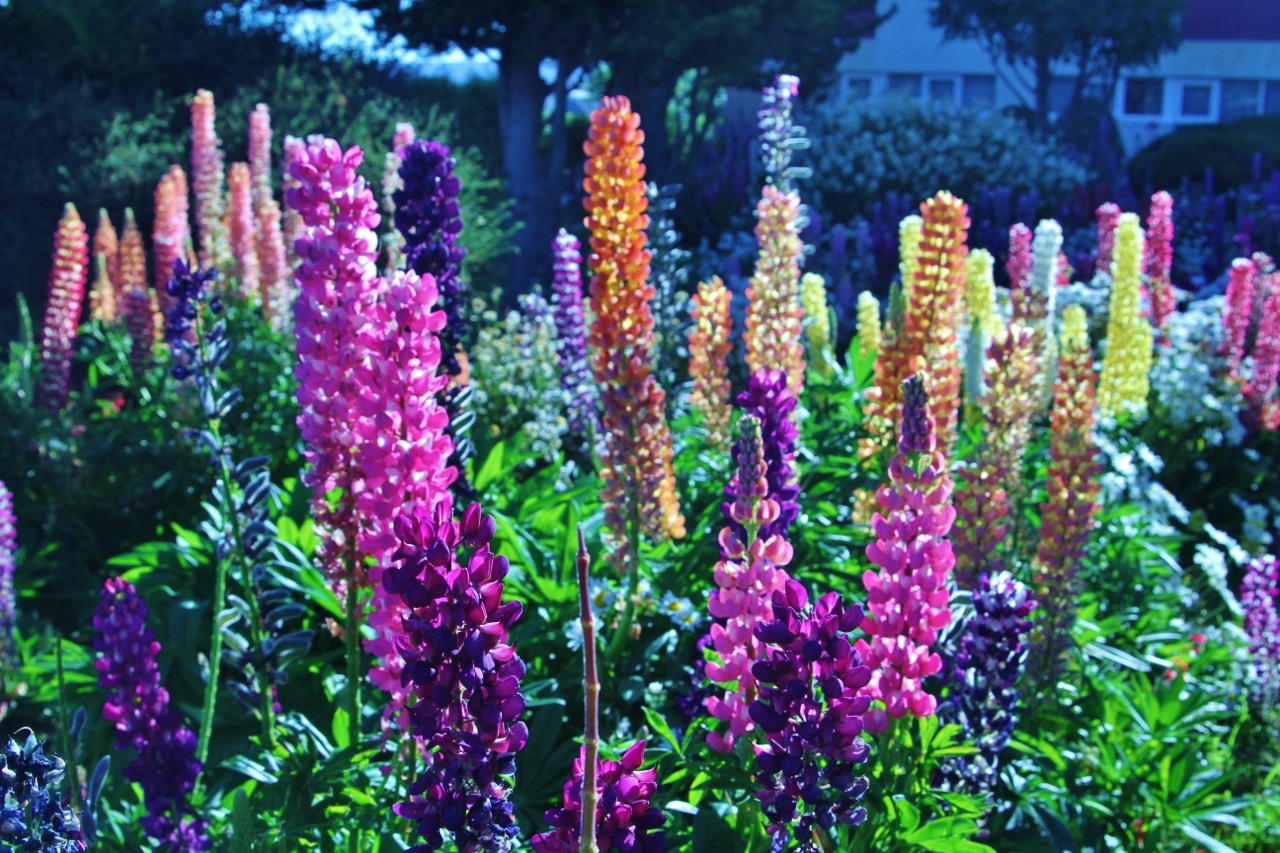
Even among native Spanish speakers, Chileans are known for speaking very quickly and using a long list of slang that isn't found any other Spanish-speaking country. Over every meal my adopted family was sure to fill me in whenever a new bit of slang came up in the conversation. It took plenty of time, but I eventually managed to get the hang of dialogue riddled with Chilean modismo like weón (dude), harto (mucho), cuático (crazy, weird, unexpected, inexplicable), cuestión (cosa), al tiro (ahora, ya), pololo/a (novio/a), copete (alcohol), fome (aburrido), luca (1000 pesos), guagua (bebé), pacos (policía), sipo (sí), yapo (sí, sure), and to respond to voseo (¿Cómo estaí?, ¿Tení hambre?)
¿Cachaí?
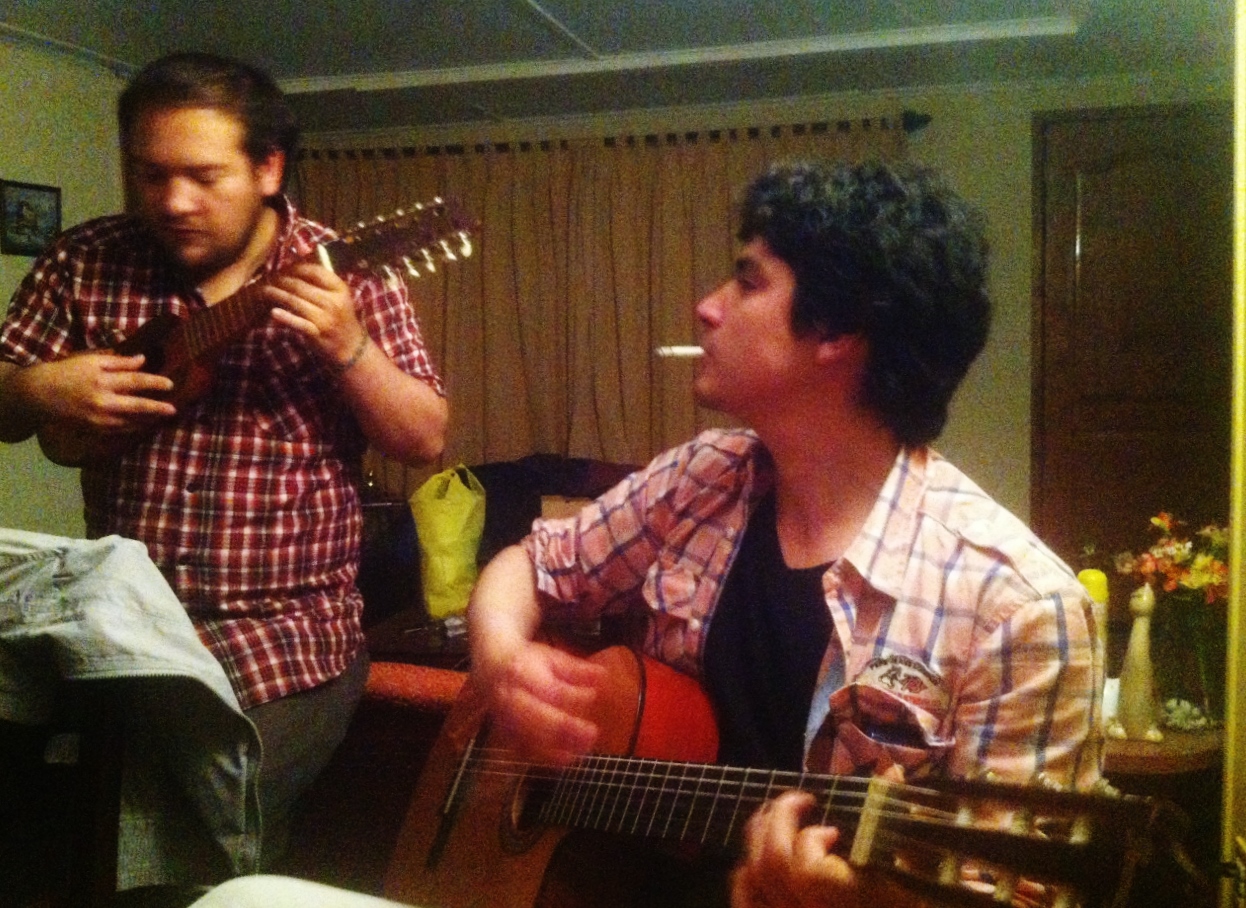
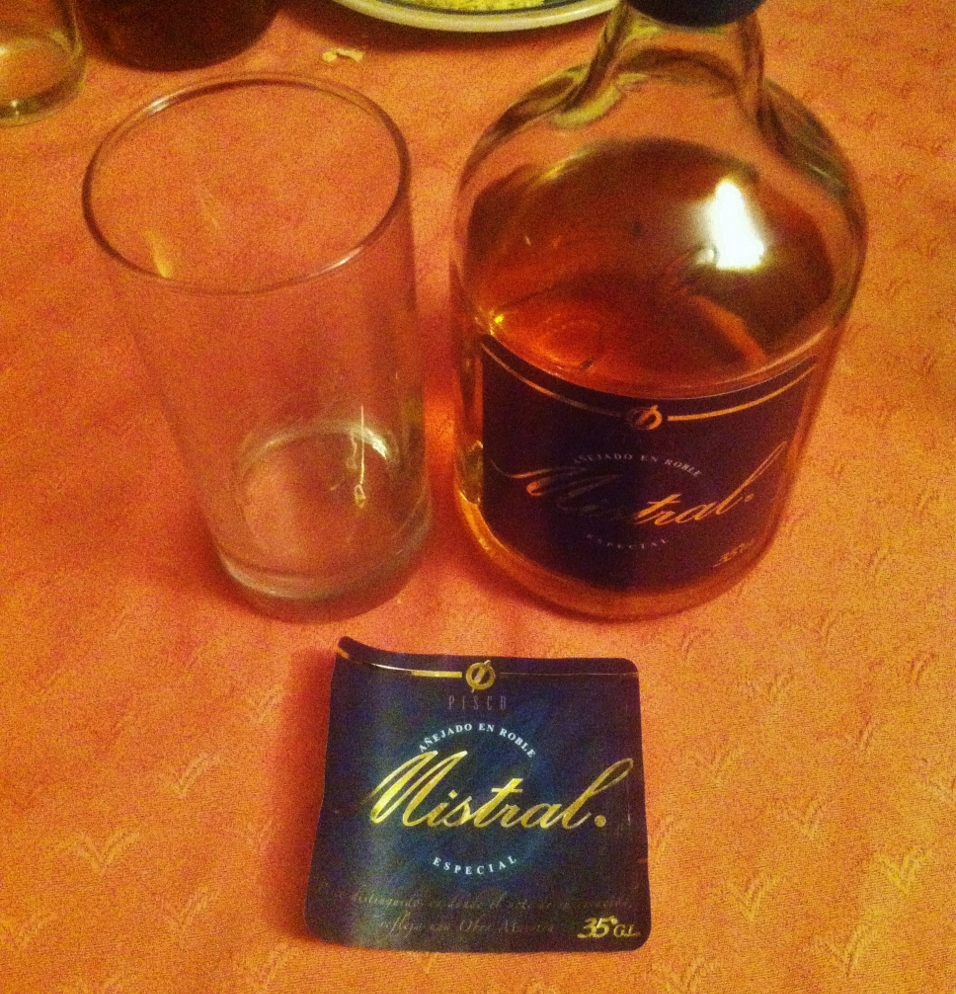
III. Somos feos y no tenemos talento
While I made busy looking for a new trusty steed to continue my journey, big Sergio and Rodrigo hatched a plan to get back to Concepción. They had hitchhiked over 1,500 miles to Torres del Paine, but needed to get back home in a hurry before the next semester's classes began. After the many hours we spent playing guitars and singing out on the patio at Oscar's house, they decided to it was worth a shot to go play in the streets to try to scrape together enough cash for a bus ticket. They made signs on the back of pizza boxes that read "Ayúdenos a volver a Concepción" and "Somos feos y no tenemos talento". Little Sergio and I came by to help when we could with backup vocals and some stylistic clapping. The setlist ranged from songs by Tommy Rey to Los Auténticos, the theme songs from Spanish-dubbed anime shows, Chilean classics such as "La Joya del Pacífico", the crowd favorite "Lamento Boliviano" ("Y estoy aquí, borracho y locoooooo"), and the occasional Eagles or Willie Nelson tune when yours truly was asked to sing. I'm not sure if it was more out of amusement or pity, but after about a week of playing the people of Punta Arenas had given them enough money for their tickets back north.
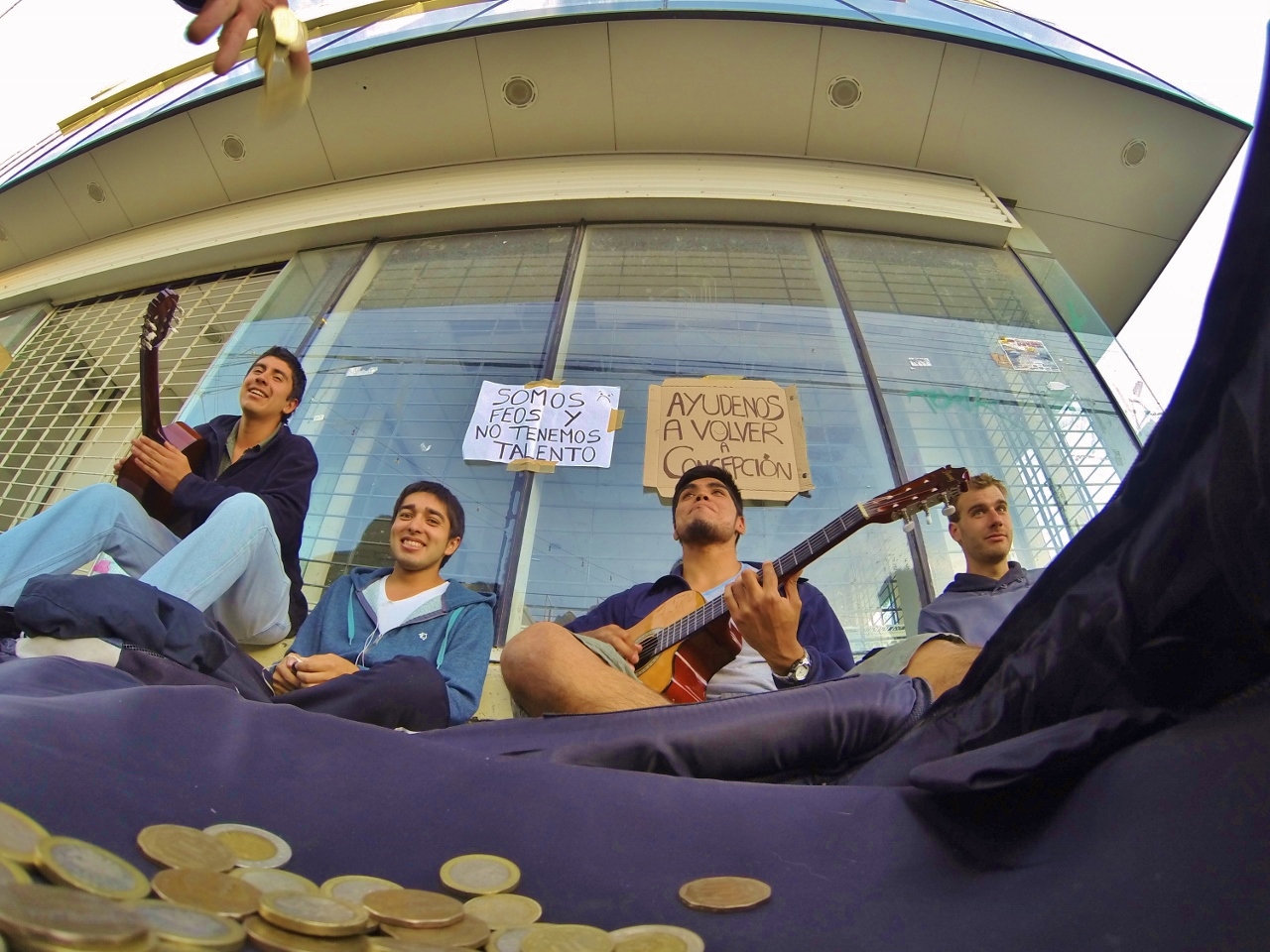
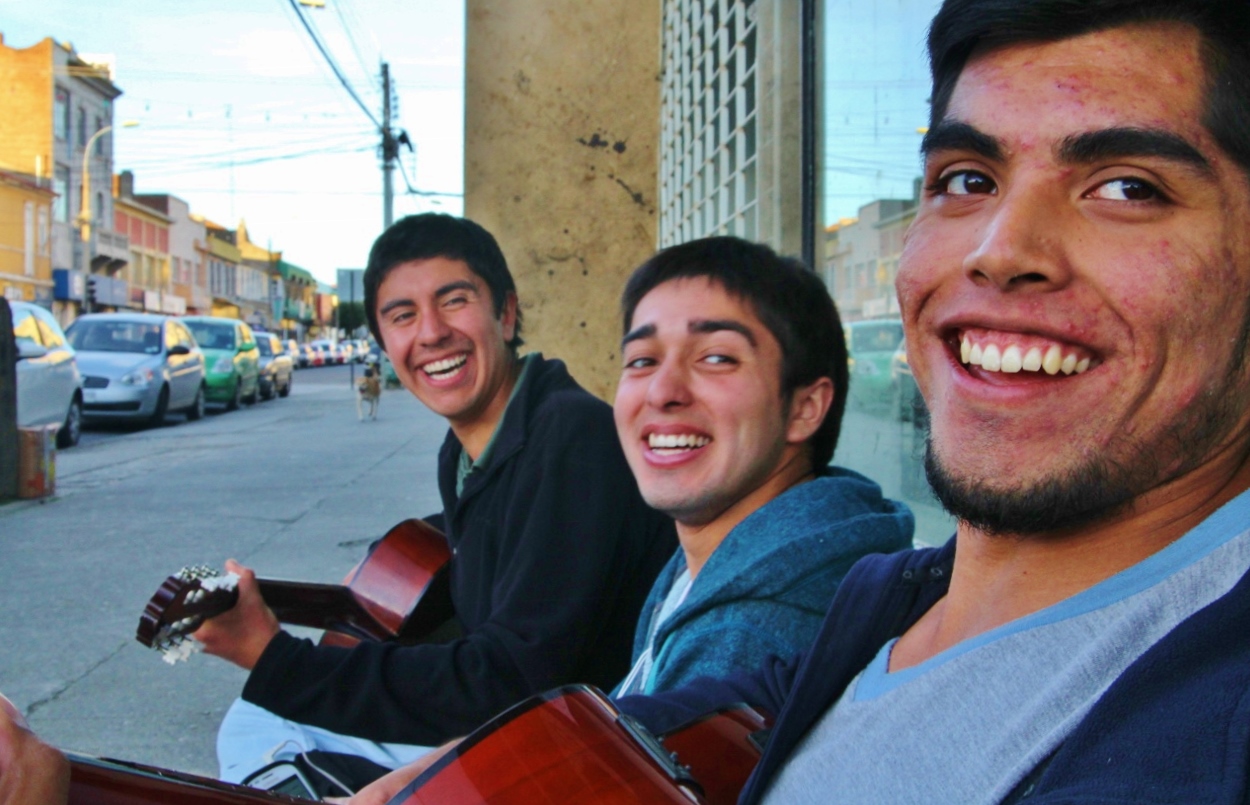

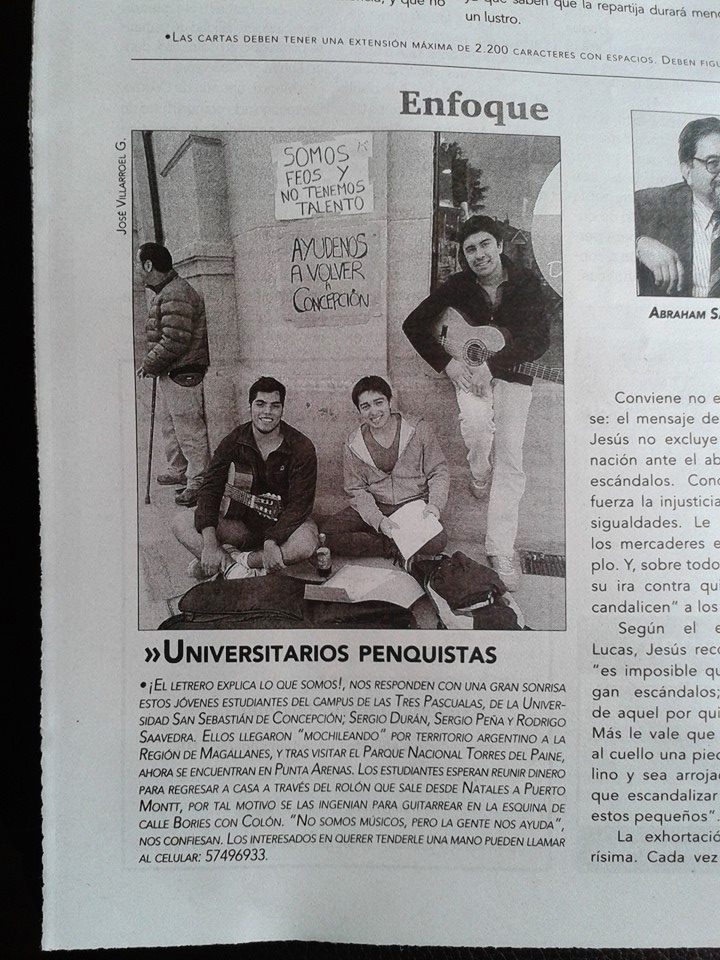
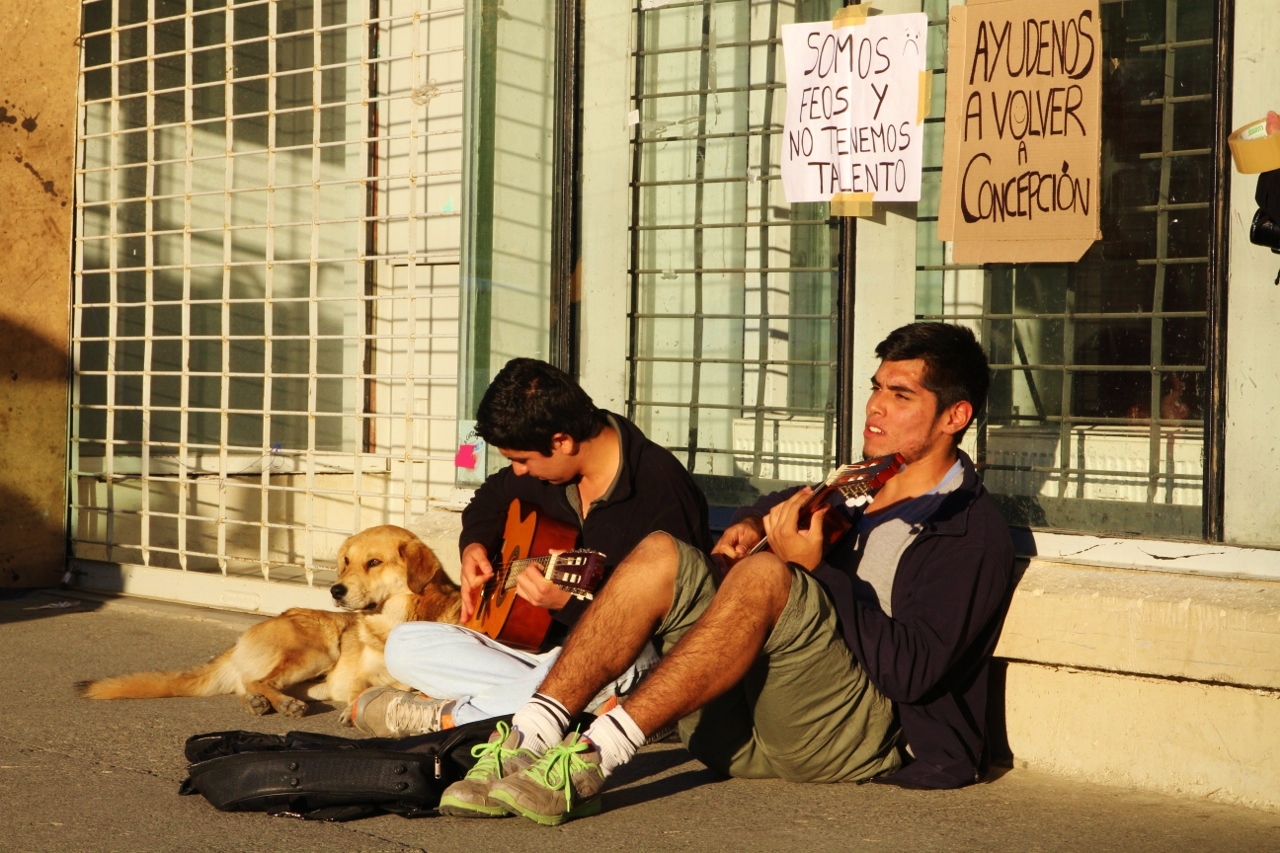
I've put together this very short behind-the-scenes documentary about the band, from practice, to the tour bus (i.e. Oscar's mom's van), to a live performance in downtown Punta Arenas.
The idea to play songs in the streets turned out to be to my favor as well. One afternoon, as we scouted for a good spot to entertain the masses, I came across this sweet, fully-loaded Kawasaki KLR650 with metal panniers, an Alaskan license plate, and a sign that said it was for sale. After meeting with the owner, he told me he had bought the bike in Alaska in July of 2013 specifically for the trip, and now that his adventure was over he was actually quite thrilled at the possibility of the bike returning back "home" to the States with me. Motorcycle owners are strangely emotional about our bikes.
Love at first sight: this pic was taken the very first time I ever saw the bike. It was meant to be
After a not-so-easy international money transfer--the details of which I won't go in to here, but feel free to contact me directly if you'd like a recommendation on how to avoid a whole lot of frustration regarding the process--the previous owner signed the bike over to me at the local notary and had his temporary vehicle import permit cancelled out by Chilean aduana (customs), and I was the new owner of an oh-so-beautiful 2013 Kawasaki KLR650. After a month at the end of the world feeling as worthless as a cowboy without his horse, I was finally able to get going again.
I would have loved to stayed longer in Punta Arenas, explored more of Magallanes on my new bike, attend more parties with Oscar, and learn more recipes from Tía Margarita, but due to the delay in buying the bike I had to depart al tiro. I had something very important waiting on me half-a-continent away in Perú.


